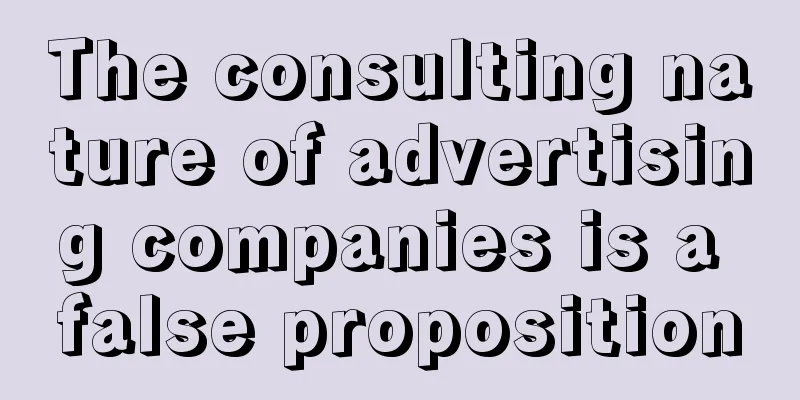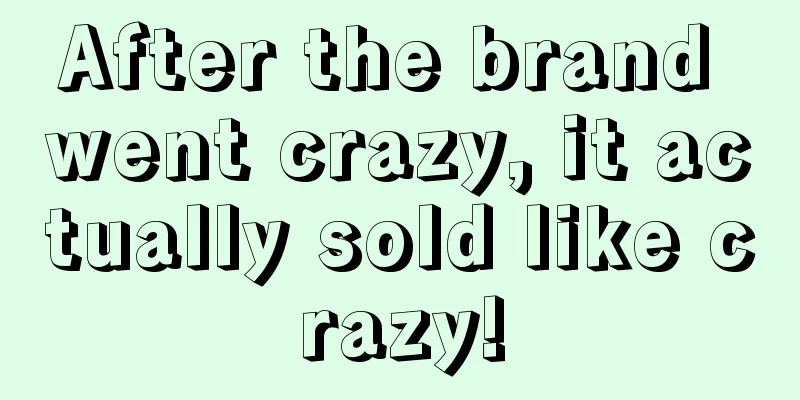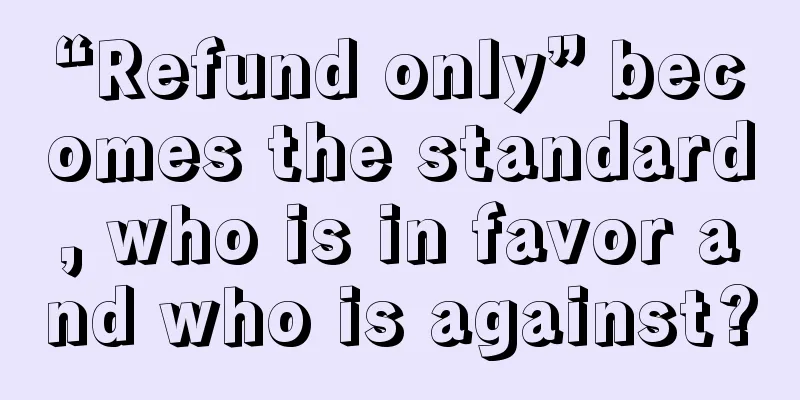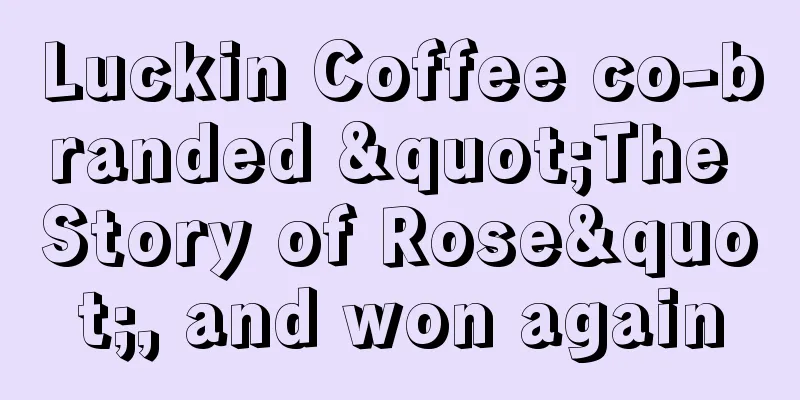The consulting nature of advertising companies is a false proposition

In the past six months, I have heard this term frequently. Indeed, I have witnessed many advertising professionals transforming themselves into consulting companies, or changing the company name from advertising company to consulting company. I have also heard that many large advertising groups have begun to establish their own consulting companies through acquisitions, sub-establishments, mergers, etc., to undertake strategic, brand, and technical consulting business. Advertising companies have become a popular trend to become consulting companies. Many people think that this will give them a higher bargaining power in the industry and allow them to charge more money from corporate clients. Instead of collecting tens of thousands, hundreds of thousands or even hundreds of thousands of yuan in monthly service fees, they can now collect tens of millions of yuan in consulting fees at one time. They thought that this would give them more say in corporate clients, and they no longer had to compete desperately for business, but clients would come to them on their own initiative. Moreover, consulting companies could choose their clients and even influence their clients’ choice of advertising agencies. But I have to pour cold water on it. The consultingization of advertising companies is a false proposition. Because advertising and consulting do not have strict business boundaries. Consulting is a broad concept, including management consulting, financial consulting, technical consulting, strategic consulting, etc. The so-called Big Four and MBB are mainly the first two. In theory, all companies that provide business advice, suggestions and solutions to enterprises are consulting. As for consulting in the marketing industry, whether it is called strategic consulting, market consulting, brand consulting, or positioning consulting, its essence is nothing more than helping clients plan the market, that is, STP, to find the market segment that the company should enter, capture the core target customers, determine product positioning, and thus drive business growth. On this basis, some companies will focus on helping enterprises plan the execution of 4P tactics, such as designing product line combinations, providing product development suggestions, formulating pricing strategies or channel strategies, providing store packaging, etc.; some companies focus on designing the top-level brand architecture for enterprises, establishing brand core values and value systems, appeals, personality settings, VI vision, etc. Let's look at the advertising industry. The core business of advertising companies is to provide enterprises with creative and communication plans. Specifically, it includes writing slogans, shooting films, doing graphic design, making materials, event planning, phased communication campaigns, annual communication plans, etc. However, before doing these, advertising companies still have a lot of desk research and strategic work to do. For example, if they want to do good creative work, do they need to do consumer research and market research? Do they need to plan brand strategy? Do they need to refine the brand's core value? Do they need to sort out the brand portfolio and product line portfolio (the main brand and main product to be promoted must be determined)? All these tasks are within the scope of market consulting business. Therefore, the business of advertising companies itself involves consulting, and there is no such thing as transformation into consulting. It's just that there are some consulting companies on the market now, who always deliberately promote themselves as helping companies formulate strategies, while advertising companies are only responsible for execution and doing odd jobs for them. This has caused some corporate clients to misunderstand that consulting companies are smarter and better than advertising companies, and naturally charge more. This is a complete misunderstanding. In the entire chain of marketing business, the front-end consumer research and market and brand strategy formulation are inseparable from the back-end communication promotion and creative content. It’s just that in the past, advertising companies emphasized their core competitiveness as creativity and did not promote their strategic capabilities too much. In fact, if we say that advertising companies are now becoming consulting companies, then from another perspective, consulting companies are also becoming advertising companies. After consulting with enterprises, many consulting companies will also give clients a slogan, design a brand logo or image IP mascot, and then use this as a carrier to promote the enterprise to do advertising and VI store and packaging implementation . And thinking of slogans, designing logos and visual images, isn't this the main business of advertising companies? There is a reason why consulting companies do this, because they need to show the results to their clients to prove that their solutions can actually drive performance and growth, and they also need to show the market and other companies in and outside the industry to prove their level and thus gain more clients. However, if the consulting company only provides the enterprise with a set of strategic planning, brand top-level architecture, organizational structure, product planning and R&D suggestions, business model design plans, etc., it will be difficult to see immediate results, because these all require long-term implementation to achieve results. How can we prove the role of consulting companies? Advertising is different. Only advertising can bring immediate results to enterprises. Especially for those enterprises that have never done branding or advertising, the effect will be very obvious when they start advertising. Because the reason is very simple. When a brand suddenly becomes well-known from nothing, and suddenly there are many more people who know it and remember it, then sales will inevitably increase. However, it is hard to say whether the effect of such advertising is sustainable and whether the cost of advertising is reasonable. Anyway, for consulting companies, as long as they bring results to enterprises, they can close the case and promote themselves in the industry. Therefore, consulting companies are now competing to help clients with advertising. Therefore, advertising companies must not blindly turn to consulting, which will lead to them losing their fundamental advantages. In the end, their strategies are not well done and their creativity is poor. On the other hand, the fundamental purpose of consulting advertising companies is to gain bargaining power and voice from clients. However, the acquisition of this power has nothing to do with the name of the company. It is not just a matter of changing the name from "advertising company" to "consulting company". The key lies in the company itself. I have been saying for several years that in the advertising and marketing industry, whether a company can afford to charge fees depends on three factors: masters, theories, and celebrity cases. 1. Be a packaging masterAdvertising companies and consulting companies sell brainpower, which is essentially a trust business. If the client has no confidence in you and does not recognize you as a person, then there is no way to do business, let alone collect money. In the traditional era, 4A advertising agencies negotiated business by relying on the golden signs of company brands such as Ogilvy, Publicis, Saatchi & Saatchi, LB, JWT, DDB, BBDO, TBWA, etc. to win the trust of clients. In today's era of self-media, the founder's IP has become increasingly important. In order to gain the trust of corporate customers and establish influence, the first thing to do is to be a packaging marketing master and create a halo effect. This was the case with Ye Maozhong in the past and Hua Shan of Hua & Hua now. This also includes the Golden Gun Uncle on Douyin. It is said that the advertising company of Golden Gun, Hong Production, charges 5 million to shoot a short film. This is the power of Douyin's big V. In fact, even a company brand like Ogilvy is like this. Ogilvy is so well-known in the industry that even outside the advertising circle, it is the only advertising company that most non-advertising professionals have heard of. Ogilvy's success is first attributed to their great founder, David Ogilvy. I think everyone agrees that Mr. Ogilvy is the most famous advertising man on the planet. And which advertising man didn't grow up reading Ogilvy's "Confessions of an Advertising Man"? Other 4A agencies such as Publicis and Saatchi & Saatchi also have a long history and are not short of representative works, but they just don’t have the IP blessing of a founder as great as Ogilvy. But unfortunately, I have seen many advertisers who do not have the awareness of creating IP or self-media. They are more keen on mixing in circles (not derogatory, just stating a fact, everyone prefers to promote their own cases and works in the advertising circle, and only participate in some activities and awards within the circle). In fact, many advertising people are well-known in the industry, but no one knows them outside the advertising industry. For example, Liang Weifeng and Ma Tulan, who became well-known in the past two years because of a workplace variety show, have actually been famous for many years, but people outside the industry don’t know them. However, being famous among your peers is useless. You have to be famous among your customers and the public. After all, your peers are just your competitors, and your customers are your bread and butter. 2. Have your own methodologyRegardless of whether you call it positioning, super symbol, conflict, brand personality theory, or shock wave marketing, you must have your own logic, system, and tools for doing business. Methodology is crucial to endorse the company's strength and win the trust of customers. Like Ogilvy mentioned above, I once answered a question on Zhihu: Why is Ogilvy so famous among so many people outside the advertising industry? My answer is that Ogilvy is the company that is best at packaging itself and advertising itself in the advertising industry. There are three ways to do this: one is the founder's IP, the second is writing books, and the third is branding its own tools, concepts, and methodologies. For example, Ogilvy’s well-known “360-degree brand steward”, and later released “Big ideaL” and “Fusion”. Ogilvy even packages the specific methods and processes of each link of advertising creation, such as the “Nine Yin Manual” for the work flow of how to make a briefing, and the “Eight Sections of Creative Brocade” for how to think of creativity. (This approach is not only vivid, but also very well localized, which is much earlier than Alibaba's Jin Yong culture and Six Meridians Divine Sword. In the early years, Li Jiaoshou became famous on the Internet. When he talked about copywriting, he also packaged the creative concepts commonly mentioned in the industry, such as user insight and visualization, into specific and vivid X-type and Y-type copywriting.) These methods and tools of Ogilvy have been widely circulated in the industry through training courses or book publishing. They have not only enhanced the company's own brand influence, but also objectively benefited the overall level of China's advertising industry. They deserve special praise. At the same time, Ogilvy and its people are particularly good at publishing books. Ogilvy is definitely the advertising company that publishes the most books in the industry. For example, in the current domestic marketing industry, the two most popular theories, positioning and super symbols, are also the ones that publish the most books. Books and methodologies together have enhanced the influence of related consulting companies in the industry. I would like to say a few more words about methodology. As a methodology, the most important thing is of course that it is useful. It must be logically consistent, theoretically tenable, able to withstand market verification, and truly help customers solve problems. There is no doubt about this and there is nothing much to say. I want to emphasize that there is another very important point about methodology, which is that it should be simple enough. If I ask you, what is the most popular marketing theory in China? It is undoubtedly the positioning theory. Although many positioning experts explain positioning theory in a very profound way, seemingly all-encompassing, and positioning is all about the past and present, everywhere. But in fact, the representative cases operated by major positioning companies basically use the same thing for positioning - category position. Helping corporate brands find a favorable position in their industry and category, such as "XX industry leader", "high-end XX", "leading sales in the industry", etc., this is positioning. For corporate customers, this is very easy to understand and implement. Even in the positioning industry, there is a saying that "positioning is easy to understand, but it is wrong when used", which is exactly what it means. Advertising companies and consulting companies are both the second party, which is an agency. It is crucial that the first party can listen to and understand the methodology you explain. When it comes to the master of marketing, it has to be Philip Kotler. The textbook used by marketing majors in major universities is Kotler’s "Marketing Management". However, if you explain Kotler's most basic marketing management system, "STP+4P", to business owners, more than half of them will be confused. Wang Chuan of Silicon Valley posted a Weibo in 2021, saying: " Many theories that are recognized by the public are popular because they are easy to spread; the reason why they are easy to spread is that they are relatively simple and easy for everyone to believe ." These words are true! Finally, the methodology must be original. For example, some people have developed theories such as placeholder, insertion, jump, borrowing, and dislocation based on positioning, and some have developed super discourse, super pattern, and word strategy based on the super symbols and brand proverbs of H&H. These are all useless. Methodology is not a word game. You cannot just make up a concept and use other people's methods. Therefore, it is very difficult to develop your own methodology. It must be useful, logically self-consistent, original and theoretically based, and not too complicated so that customers can understand it. I have been aware of the importance of original methodology since 2014, but after ten years of research and thinking, I have not yet fully developed my own theoretical system. I can only say that I have completed a small step. It is really difficult. 3. Have star casesEvery agency has its own corporate clients, but having clients does not mean having cases. In fact, most agencies have “clients but no cases”. Especially for many large companies, there are so many second parties and suppliers around them. Even companies that make X-shaped display stands for big brands such as Coca-Cola and Luckin Coffee and put in a few influencers will claim that they serve these brands. Therefore, the so-called case must first be able to clearly explain what you have done for the client. It must have specific content, actions, and works, and cannot be just general services. This specific action and work must also be influential in the industry and generally known by industry insiders. Then this is a case. And if your case is known to even ordinary consumers and makes people exclaim "it turned out you did it", then congratulations, you have a star case. Celebrity cases are extremely important for consulting companies to do business. For example, the phrase "If you are afraid of getting angry, drink Wanglaoji" has been a problem for positioning companies for ten years. Hua & Hua's fame today is inseparable from the success of Mixue Bingcheng and Xibei. When Weibo was at its peak, everyone knew about Huanshi Interactive when mentioning Durex's Weibo marketing. When mentioning Shengjia and Qun Yushan, many people can think of Bilibili's "Hou Lang" and the classic copywriting and brand films of "Kicking Into the Wall". To create a star case, it is particularly important to test the agency's ability to screen clients. In this regard, 4A companies are particularly disadvantaged because many of the clients served by 4A are mature brands and internationally renowned brands. For example, if you provide services to Coca-Cola, no matter how successful the brand is or how good its performance is, no one will think that it is the credit of your advertising company because the brand itself is very strong. But if a startup or a new brand finds a second party and its performance soars and it becomes a well-known brand, then everyone will think that the second party is very powerful. Although in fact, it may have nothing to do with the second party, but people still attribute it in this way. Therefore, Party B must be aware and especially capable of screening those corporate clients who have growth potential and space, are willing to invest resources in branding and marketing, and identify with you. Masters, methodology, and celebrity cases, these three things will eliminate at least 90% of agencies. Without these things, it is doomed to be difficult to achieve great success in the advertising and marketing industry. In the advertising industry, Qun Yu Shan is the only brand consulting company that has all three in my mind. Although it is not easy to do, this is the direction to work towards. If you do not cultivate these, but instead make superficial efforts on the company name, or even believe that changing the name will improve the business, then you are going astray. Whether you can afford the fees, what does the name have to do with it? Finally, I would like to talk about the deeper reason why advertising companies always want to switch to consulting, which is the inherent deficiencies of advertising companies. As mentioned before, the core competitiveness of advertising companies lies in creative communication. Although I have seen many business owners attach great importance to this, and even like to write slogans and think of creative ideas by themselves, in most companies, creative communication belongs to the tactical implementation link, and the boss does not pay much attention to it and will not participate in it. It is unlikely to be a "top leader project". Since it does not receive the attention of the business owner, the influence and voice of the advertising company on the company are very limited, and it is difficult to increase the fees. After the 1990s, with the successive proposals of David Aaker's brand asset theory and Don Schultz's integrated marketing communications theory, advertising companies found a strategic fulcrum for themselves - that is, brand. In the early 1990s, Ogilvy & Mather proposed the operating concept of "brand steward", emphasizing that advertising companies are not just about creativity and shooting commercials, but are responsible for the overall brand management of the company. Advertising companies should participate in the brand building of enterprises to ensure that all brand-related marketing actions of the enterprises can be integrated and "speak with one voice" to jointly realize investment in the long-term value of the brand and accumulate brand assets. Since then, major advertising companies have successively put forward their own brand management concepts, such as JWT's TTB (Thompson Total Branding), Bates' Brand Wheel/Essence, McCann's Brand Imprints, and Saatchi's Lovemarks. Moreover, from then on, advertising companies no longer call themselves advertising companies, but are called brand agencies. The company exists to operate and manage the brand of an agency. As a strategic fulcrum, brand has enhanced the influence and leading role of advertising companies on corporate strategies. As we all know, brand is the most important asset of a company and one of the direct factors of sales. In fact, this is the same reason why advertising companies today do not call themselves advertising companies, but consulting companies. However, emphasizing branding also has its own problems. Because the concept of branding can be big or small for a company. In a broad sense, branding can include everything in a company. Products, services, pricing, advertising, public relations, activities, channels, stores, etc. are all part of branding. Branding can become the top priority of a company. However, from the perspective of the actual organizational structure of enterprises, the brand department is often just a secondary department in many enterprises. The person in charge of the brand department is actually in charge of advertising and communication, and does not have much say or decision-making power over corporate strategy. Therefore, the advertising company hired by the brand department naturally cannot influence the top management of the enterprise. This is the inherent deficiency of advertising agencies, and it is also the fundamental reason why advertising agencies have begun to turn to consulting and talk about strategy, positioning, and growth. Advertising agencies want to find a new strategic fulcrum for themselves. During the Spring and Autumn Period and the Warring States Period, Duke Xiao of Qin issued an order to recruit talented people. Shang Yang entered Qin and used three ideas, namely the kingly way, the imperial way and the hegemonic way, to persuade Duke Xiao of Qin. As a result, Duke Xiao was not interested in the first two ideas. It was not until he talked about the hegemonic way that Duke Xiao talked with Shang Yang for three days and three nights. From then on, he entrusted all the important affairs of state to Shang Yang. This was also because the competition was not fierce enough at that time. How could Shang Yang have three opportunities to propose a proposal today? Shang Yang was actually a consultant who was looking for a strategic fulcrum to test the Qin boss and get a service opportunity. The same goes for today's advertising companies. They can't just think that coming up with good ideas and making good commercials is enough. The key is to find a strategic fulcrum for their creativity, what business problems it really solves, and whether it can bring substantial changes and impact to the business. At the same time, advertising companies cannot just focus on the back-end of creative communication, but also need to speak out on the front-end market strategy and brand strategy, convey their own ideas and methodologies to the outside world, and influence corporate customers and the industry. And while doing a good job in creative communication, they should also extend some of their business forward to help companies improve their market and brand plans. Ayn Rand once said that you can’t leave the world to people you despise. This also applies to the advertising and marketing world. Author: Empty-handed WeChat public account: Empty Hands (ID: firesteal13) |
>>: Live streaming is difficult, how should we do it?
Recommend
Can foreign bloggers still make money by sitting back and doing nothing?
With the rise of the traffic era, a large number o...
Is it reliable to sell or transfer an Amazon online store? What are the risks?
Although Amazon has a large amount of traffic, the...
What should I do if I don't have turnover when opening a personal store on Shopee? What are the requirements for turnover?
Many individuals open stores on the Shopee platfor...
Can you make money by starting a cross-border e-commerce business with Shopee? What are the money-making skills?
With the rapid development of the Internet, cross-...
No longer competing on low prices? Douyin e-commerce starts playing the "high-end card"
Recently, the female star Aya and her bestie Zhou ...
Building a data indicator system, I summarized the entire standardization process
In the world of data analysis, building an effecti...
How can an amateur become a blogger on Xiaohongshu? Refer to these 3 ways to create a blogger account
When operating an account on Xiaohongshu or before...
Yu Wenliang's fans surged by more than 3 million, but he couldn't ease his anxiety about monetizing short videos
With 2.38 million followers in one week and more t...
Can I still register if my Shopee registration is rejected? How long does it take to register?
There are many partners who apply to join Shopee, ...
Avoid illegal words in Douyin, Xiaohongshu and Video Account
The platform's rules are constantly being adju...
Can individuals register on Jumia? What do I need to prepare to open a store on Jumia?
Nowadays, e-commerce is developing very fast in ma...
E-commerce Double 11 competition: an overview of the four core changes in 2023
The annual Double 11 Shopping Festival is coming, ...
This year's Double 11 is unusual, and the platform has begun to reduce the burden on merchants
Compared with previous years, this year's Doub...
Can I modify the price after listing on Shopee? How to set up discounts?
As e-commerce platforms continue to grow, more and...
Breaking news! Video accounts shut down the interactive barrage gameplay. What’s the reason?
Did you know that Video Account announced that it ...









